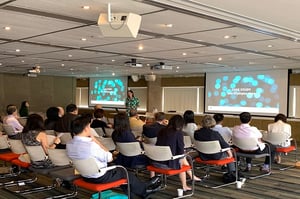Hong Kong's litigation funding market is at a pivotal juncture. Despite legal constraints that limit its application, the sector is witnessing new developments that could reshape how disputes are financed across the region.
This article summarises a radio interview originally broadcast on RTHK's "The Close" on 5 June 2025, featuring Irene Lee, General Counsel for Greater China and Southeast Asia at Deminor, speaking with RTHK about the current state and future prospects of litigation funding in Hong Kong. The full interview is available on Apple Podcasts.
What is Litigation Funding?
Litigation funding is a financial arrangement whereby third-party funders cover the expenses in legal proceedings. Funders typically pay for legal fees, expert fees, court fees, arbitration costs, and any disbursements directly related to dispute resolution processes.
The arrangement operates on a "no cure, no pay" basis, meaning funders only receive investment returns if clients both win their cases and successfully enforce damage awards. When clients fail to recover damages, funders face complete financial loss without any return on their investment.
Hong Kong's Constrained Market
Hong Kong's litigation funding market remains constrained by historical legal doctrine. The old common law principles of maintenance and champerty continue to apply, prohibiting litigation funding in general court proceedings. This represents a significant departure from English law, which abolished these doctrines decades ago.
Legislative changes have, however, created specific exceptions. Since 2019, the amended Arbitration Ordinance has permitted litigation funding in arbitration proceedings and insolvency-related cases. Case law has also recognised third-party litigation funding in certain circumstances.
Market uptake remains limited despite these legal developments. Statistics from the Hong Kong International Arbitration Centre reveal only one disclosure of litigation funding in 2024 and one in 2023, with slightly higher numbers in 2022. This modest activity suggests significant growth potential in Hong Kong's dispute resolution market, where greater awareness of litigation funding options could benefit claimants facing substantial legal costs.
How Cases Are Selected
The inherent risks in litigation funding demand rigorous case evaluation across three critical dimensions. Legal merits form the foundation of any funding decision, requiring assessment of whether clients will likely win their cases and obtain favourable decisions. Without legal success, neither clients nor funders can recover their investments.
Financial viability represents the second crucial factor. Funders analyse total legal budgets required for claims, including enforcement costs and potential appeal expenses, against likely damage awards. Cases involving small potential damages but high legal costs prove economically unviable.
The third consideration, often overlooked, involves enforcement risk. Clients seek actual compensation, not merely favourable legal declarations. This requires thorough due diligence on the counterparties’ financial positions, including asset location, asset nature, and recovery prospects across different jurisdictions. Specialist in-house teams conduct legal analysis, financial assessment, and asset tracing, supplemented by external experts when necessary.
Funding Structure and Returns
Successful litigation funding arrangements involve transparent cost structures and return calculations. When clients win their cases, funders first recover their investment amounts before calculating returns through two distinct formulas: a multiple formula based on invested amounts and a percentage formula applied to net case proceeds.
Funding agreements typically include both formulas to ensure transparency, with specific numbers varying case by case. The return structure incorporates time-based adjustments: longer cases command higher returns due to increased risk and extended capital commitment. Returns are capped after approximately six to seven years to prevent excessive accumulation over extended periods.
The Enforcement Trend
The litigation funding sector has experienced a notable shift in recent months, particularly regarding enforcement proceedings. There has been a substantial increase in funding requests for enforcement matters, whereby clients have already obtained favourable arbitral awards or court judgements but require assistance with collection efforts.
These enforcement-focused requests often originate from financial institutions and asset managers rather than clients lacking financial resources. These sophisticated parties seek risk allocation and financial planning benefits, transferring enforcement risks to funders whilst accessing specialised expertise. Many have attempted enforcement in their home jurisdictions but encountered insufficient assets to satisfy judgement debts.
Enforcement proceedings frequently involve complex, multi-jurisdictional strategies requiring asset tracing across multiple countries. Funders may need to identify personal guarantors whose locations are unknown or pursue assets transferred to third parties. These cases often necessitate simultaneous proceedings in multiple jurisdictions, with follow-up legal actions to recover transferred assets.
Market Outlook
Hong Kong's litigation funding market stands at a developmental crossroads. Whilst legal restrictions continue to limit general court proceedings, the availability of funding for arbitration and insolvency matters creates opportunities for growth. The increasing complexity of cross-border disputes and enforcement challenges suggests continued demand for sophisticated funding arrangements.
The recent surge in enforcement-related funding requests indicates market maturation, with clients recognising the value of specialist expertise in asset recovery. As awareness grows and legal frameworks potentially evolve, Hong Kong's position as a regional dispute resolution centre could benefit from expanded litigation funding options.
The combination of established legal infrastructure, international connectivity, and growing recognition of litigation funding benefits positions Hong Kong for potential market expansion. However, broader legislative reform may be necessary to fully realise this potential and align Hong Kong's approach with international best practices.
For the full interview on litigation funding in Hong Kong, listen to "The Close" radio show on RTHK. The complete discussion is available on Apple Podcasts.







